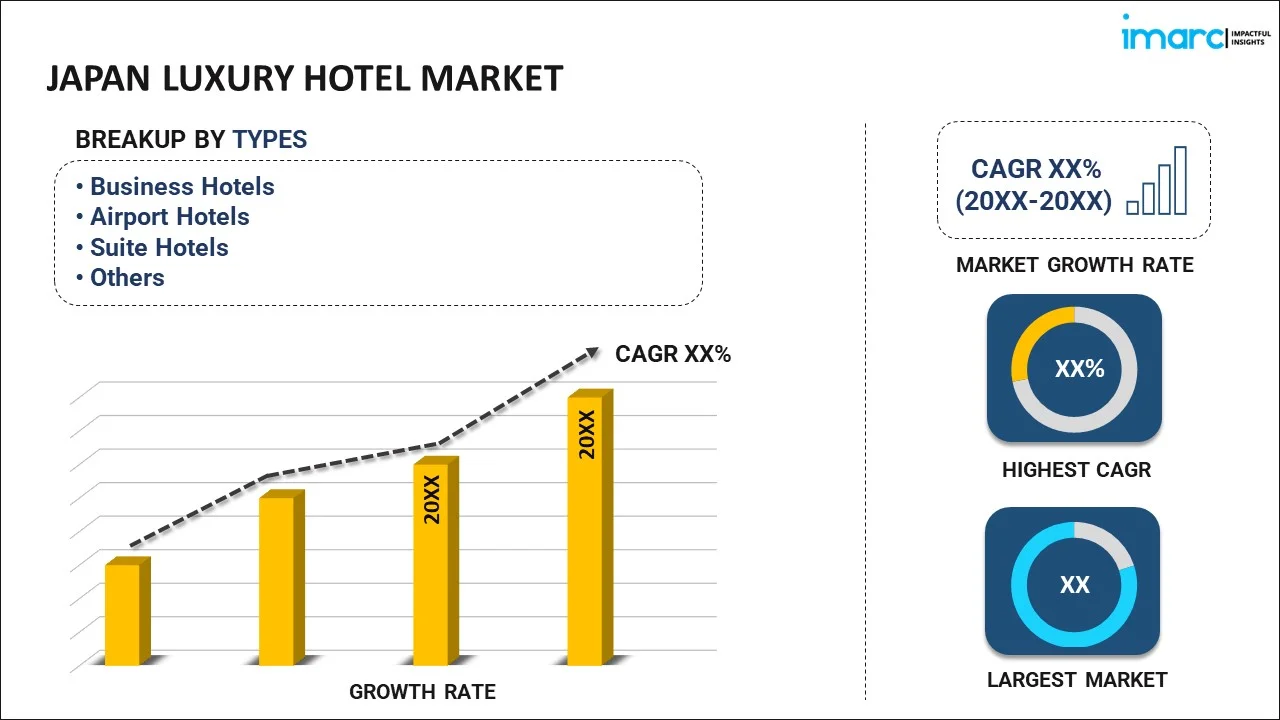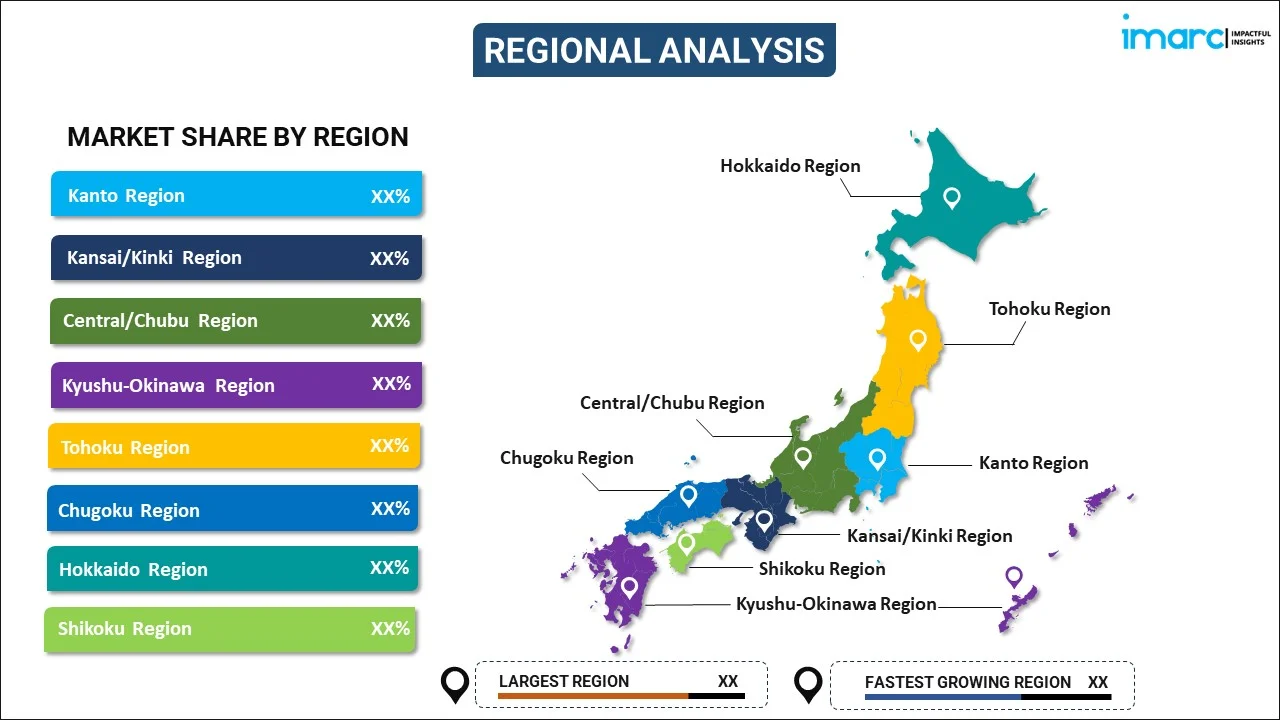
Japan Luxury Hotel Market Report by Type (Business Hotels, Airport Hotels, Suite Hotels, Resorts, and Others), Room Type (Luxury, Upper-Upscale, Upscale), Category (Chain, Independent), and Region 2026-2034
Market Overview:
Japan luxury hotel market size reached USD 7.3 Billion in 2025. Looking forward, IMARC Group expects the market to reach USD 10.2 Billion by 2034, exhibiting a growth rate (CAGR) of 3.80% during 2026-2034. The increasing advancements in technology, like high-speed internet, smart rooms, and sophisticated mobile apps that allow seamless operations, are primarily driving the market.
|
Report Attribute
|
Key Statistics
|
|---|---|
|
Base Year
|
2025 |
|
Forecast Years
|
2026-2034 |
|
Historical Years
|
2020-2025
|
| Market Size in 2025 | USD 7.3 Billion |
| Market Forecast in 2034 | USD 10.2 Billion |
| Market Growth Rate (2026-2034) | 3.80% |
A luxury hotel is a refined and opulent accommodation establishment that offers an exceptional level of comfort, service, and amenities to its guests. These establishments cater to discerning travelers seeking a lavish and indulgent experience. Typically located in prime, often picturesque destinations, luxury hotels boast meticulously designed interiors, exquisite furnishings, and sumptuous decor that exude elegance and sophistication. Guests at luxury hotels can expect personalized and attentive service, with staff anticipating their every need. The rooms and suites are spacious, lavishly appointed, and equipped with high-end amenities like premium bedding, state-of-the-art technology, and luxurious toiletries. Many luxury hotels also feature world-class dining options, spa facilities, fitness centers, and, often, breathtaking views. The allure of a luxury hotel lies not just in its physical attributes but also in the overall ambiance it creates – a cocoon of tranquility and indulgence that allows guests to escape the ordinary and immerse themselves in a world of comfort and extravagance. These establishments are known for creating unforgettable experiences, making them a preferred choice for those seeking the pinnacle of hospitality and refinement.
Japan Luxury Hotel Market Trends:
The luxury hotel market in Japan is driven by several key factors, each interlinked and contributing to its sustained growth. Firstly, the rising disposable incomes of consumers have led to an increased demand for premium experiences. Consequently, as people seek exclusivity and opulence in their travel experiences, luxury hotels have become a natural choice. Furthermore, the regional tourism industry's expansion, propelled by improved connectivity and a desire for unique experiences, has also fueled the growth of luxury accommodations. As a result, luxury hotels strategically position themselves in prime tourist destinations, taking advantage of this trend. Additionally, the millennial and Gen Z demographics have shown a preference for experiential travel, where the hotel itself is an integral part of the experience. Consequently, luxury hotels have evolved to offer more than just accommodation, providing immersive and personalized experiences that cater to individual preferences. This personalization is made possible by advancements in technology, enabling hotels to anticipate guest needs and provide bespoke services seamlessly. Lastly, sustainability and eco-consciousness have become pivotal in the luxury sector, as travelers seek environmentally responsible options. Luxury hotels are responding by adopting sustainable practices and integrating eco-friendly features into their offerings, aligning with evolving consumer values. This, in turn, is expected to drive the hotel market in Japan.
Japan Luxury Hotel Market Segmentation:
IMARC Group provides an analysis of the key trends in each segment of the market, along with forecasts at the country level for 2026-2034. Our report has categorized the market based on type, room type, and category.
Type Insights:

- Business Hotels
- Airport Hotels
- Suite Hotels
- Resorts
- Others
The report has provided a detailed breakup and analysis of the market based on the type. This includes business hotels, airport hotels, suite hotels, resorts, and others.
Room Type Insights:
- Luxury
- Upper-Upscale
- Upscale
A detailed breakup and analysis of the market based on the room type have also been provided in the report. This includes luxury, upper-upscale, and upscale.
Category Insights:
- Chain
- Independent
The report has provided a detailed breakup and analysis of the market based on the category. This includes chain and Independent.
Regional Insights:

- Kanto Region
- Kansai/Kinki Region
- Central/ Chubu Region
- Kyushu-Okinawa Region
- Tohoku Region
- Chugoku Region
- Hokkaido Region
- Shikoku Region
The report has also provided a comprehensive analysis of all the major regional markets, which include Kanto Region, Kansai/Kinki Region, Central/ Chubu Region, Kyushu-Okinawa Region, Tohoku Region, Chugoku Region, Hokkaido Region, and Shikoku Region.
Competitive Landscape:
The market research report has also provided a comprehensive analysis of the competitive landscape in the market. Competitive analysis such as market structure, key player positioning, top winning strategies, competitive dashboard, and company evaluation quadrant has been covered in the report. Also, detailed profiles of all major companies have been provided. Some of the key players include:
- Accor S.A.
- Belmond Ltd. (LVMH Moët Hennessy Louis Vuitton)
- Four Seasons Hotels Limited
- Mandarin Oriental Hotel Group International Limited
- Marriott International Inc.
- Shangri-La International Hotel Management Ltd.
(Please note that this is only a partial list of the key players, and the complete list is provided in the report.)
Japan Luxury Hotel Market Report Coverage:
| Report Features | Details |
|---|---|
| Base Year of the Analysis | 2025 |
| Historical Period | 2020-2025 |
| Forecast Period | 2026-2034 |
| Units | Billion USD |
| Scope of the Report | Exploration of Historical and Forecast Trends, Industry Catalysts and Challenges, Segment-Wise Historical and Predictive Market Assessment:
|
| Types Covered | Business Hotels, Airport Hotels, Suite Hotels, Resorts, Others |
| Room Types Covered | Luxury, Upper-Upscale, Upscale |
| Categories Covered | Chain, Independent |
| Regions Covered | Kanto Region, Kansai/Kinki Region, Central/ Chubu Region, Kyushu-Okinawa Region, Tohoku Region, Chugoku Region, Hokkaido Region, Shikoku Region |
| Companies Covered | Accor S.A., Belmond Ltd. (LVMH Moët Hennessy Louis Vuitton), Four Seasons Hotels Limited, Mandarin Oriental Hotel Group International Limited, Marriott International Inc., Shangri-La International Hotel Management Ltd., etc. |
| Customization Scope | 10% Free Customization |
| Post-Sale Analyst Support | 10-12 Weeks |
| Delivery Format | PDF and Excel through Email (We can also provide the editable version of the report in PPT/Word format on special request) |
Key Questions Answered in This Report:
- How has the Japan luxury hotel market performed so far and how will it perform in the coming years?
- What has been the impact of COVID-19 on the Japan luxury hotel market?
- What is the breakup of the Japan luxury hotel market on the basis of type?
- What is the breakup of the Japan luxury hotel market on the basis of room type?
- What is the breakup of the Japan luxury hotel market on the basis of category?
- What are the various stages in the value chain of the Japan luxury hotel market?
- What are the key driving factors and challenges in the Japan luxury hotel?
- What is the structure of the Japan luxury hotel market and who are the key players?
- What is the degree of competition in the Japan luxury hotel market?
Key Benefits for Stakeholders:
- IMARC’s industry report offers a comprehensive quantitative analysis of various market segments, historical and current market trends, market forecasts, and dynamics of the Japan luxury hotel market from 2020-2034.
- The research report provides the latest information on the market drivers, challenges, and opportunities in the Japan luxury hotel market.
- Porter's five forces analysis assist stakeholders in assessing the impact of new entrants, competitive rivalry, supplier power, buyer power, and the threat of substitution. It helps stakeholders to analyze the level of competition within the Japan luxury hotel industry and its attractiveness.
- Competitive landscape allows stakeholders to understand their competitive environment and provides an insight into the current positions of key players in the market.
Need more help?
- Speak to our experienced analysts for insights on the current market scenarios.
- Include additional segments and countries to customize the report as per your requirement.
- Gain an unparalleled competitive advantage in your domain by understanding how to utilize the report and positively impacting your operations and revenue.
- For further assistance, please connect with our analysts.
 Request Customization
Request Customization
 Speak to an Analyst
Speak to an Analyst
 Request Brochure
Request Brochure
 Inquire Before Buying
Inquire Before Buying




.webp)




.webp)












